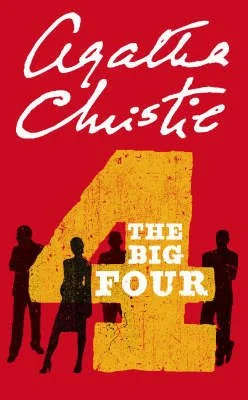The Big Four
by Agatha Christie
3 out of 5 stars
Agatha Christie's "The Big Four" has long been overshadowed by its predecessor, the iconic "The Murder of Roger Ackroyd." However, delving into this novel with knowledge of the author's life during its creation paints a richer picture of both the book and the author herself.
In 1927, Agatha Christie faced a series of profound personal challenges. Just a year earlier, in April 1926, she had tragically lost her mother. On top of that, her marriage to Archibald Christie was crumbling, as he had initiated divorce proceedings in August of the same year. The situation took a mysterious turn in December when Agatha went missing for an astonishing 11 days following an argument with her husband, who had left to spend the weekend with friends. The baffling aspect was her return, as she was discovered safe at a hotel, seemingly suffering from amnesia. Amidst all this emotional turmoil during 1926-27, Christie also found herself in dire financial need.
It was in this difficult time that her brother-in-law, Campbell Christie, came to her aid. He suggested the idea of compiling her ‘Sketch’ stories into a single novel. This collaborative effort aimed to alleviate the stress of creating an entirely new work while still providing the much-needed financial relief. Campbell's assistance primarily involved refining the beginnings and endings of the stories to create a more cohesive narrative for book publication. Interestingly, the substance of each story remained largely unchanged between the original short story versions and the novel adaptation.
Agatha Christie herself reflected on this period years later, writing to her agent in 1942 about the necessity of having a manuscript "up her sleeve" during challenging times. She mentioned the time when she had to produce "The Big Four" under financial pressure, alongside "The Mystery of the Blue Train," which she described as a trying experience.
With this context in mind, let's revisit "The Big Four." While it may not have the same acclaim as some of Christie's other works, it's important to appreciate it within the context of her life at the time. It was a product of necessity, a creative response to personal turmoil, and a testament to her determination as a writer.
The novel itself offers readers a departure from Christie's typical style. It features Hercule Poirot in a high-stakes, globe-trotting adventure filled with international espionage and a criminal cabal known as The Big Four. The change in tempo and style may not resonate with all Christie enthusiasts, but for those willing to embrace this unique iteration of her world, "The Big Four" is a thrilling ride.
As always, Christie's character craftsmanship shines through. Poirot, with his meticulous nature and brilliant deductive skills, is at the forefront, navigating a web of danger and deception. Captain Hastings provides the perfect foil to Poirot's brilliance, grounding the story with his relatable charm.
The villains, known as The Big Four, are a departure from Christie's usual suspects. They are larger than life, yet Christie skillfully avoids turning them into mere caricatures. Each member possesses a distinct identity and motivation, making them formidable adversaries.
In terms of plot, Christie delivers suspense and surprise, taking readers on a whirlwind tour of exotic locales and mind-bending puzzles. While occasionally bordering on the fantastical, the narrative remains gripping throughout.
"The Big Four" is a testament to Agatha Christie's resilience and adaptability as a writer. It showcases her ability to transcend her own genre, offering readers a story that is as much an action-packed adventure as it is a detective novel. Understanding the circumstances in which it was written adds depth to the appreciation of this novel, making it a must-read for those looking to explore the breadth of her storytelling skills.
In conclusion, "The Big Four" may not have received the same praise as some of Christie's other works, but it stands as evidence to her creativity in the face of adversity. It's a novel that deserves recognition not only for its narrative but also for the remarkable woman who wrote it during a challenging chapter of her life.
MY BLOG - BOOK REVIEWS, WRITER WOES, BOOK RECOMMENDATIONS, FAVE BOOKSTORES
Click Here to View my Goodreads Profile!
Please feel free to comment on my blog posts! I would love your feedback on book reviews, writer woes, book recommendations, and bookstore highlights!




I reflect on the challenges of secondary infertility, balancing motherhood with full-time work, and struggling to find time for creative writing. Despite setbacks, I’m learning to persevere with love, determination, and a little Taylor Swift.